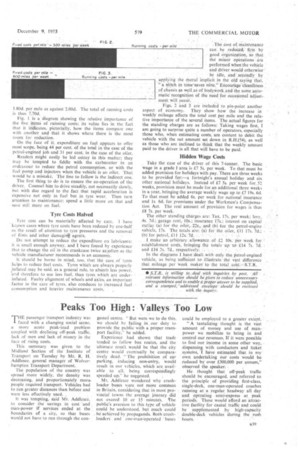Peaks Too High: Valleys Too Low
Page 73

If you've noticed an error in this article please click here to report it so we can fix it.
THE passenger transport industry was faced with a changing social scene, a more acute peak-load problem coupled with declining off-peak traffic, lack of men and lack of money in the lace of rising costs.
This summary was given to the Midland Section of the Institute of Transport on Tuesday by Mr. R. H. Addlesee. general manager of Wolverhampton Transport Department.
Ile population of the country was spread more widely, the density was decreasing, and proportionately more. people required transport. Vehicles had to run greater distances than before and were less effectively used.
It was tempting, gaid Mr. Addlesee, to consider the savings in cost -and man-power if services ended at the boundaries of a city, so that buses would not have to run through the con gested centre. " But were we to do this, we should be failing in . our duty to provide the public with a proper transport facility," he added.
Experience had shown that trade tended to follow bus routes, and the ultimate result would be that the city centre would eventually be comparatively dead. "The prohibition of car parking, inducing non-entry, would result in our vehicles, which are avaitable to all, being correspondingly speeded up," he suggested.
Mr. Addlesee wondered why crushloader buses were not more common in Britain, considering that in most provincial towns the average journey did not exceed 10 or 15 minute's. The public's aversion to this type of vehicle could be understood, but much could bd achieved by propaganda. Both'crushloaders and one-mane:Operated buses could be employed to a greater extent, , "A tantalizing thought is the vast amount of money and use of manpower we mobilize to bring in and control our revenues. If it were possible to find our income in some other way, . dispensing with conductors and ticket systems, `I have estimated that in my own undertaking our costs would be .reduced by over £300,000 per annum," observed the speaker.
He thought that off-peak traffic should be encouraged, and referred to the principle of providing first-class, single-deck, one-man-operated coaches running at a regular headway all day and operating semi-express at peak periods. These would afford an attractive facility for casual traffic and could be supplemented by high-capacity double-deck vehicles during the rush hours.




















































































































